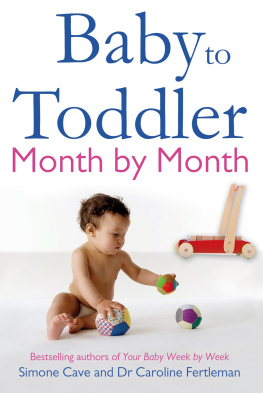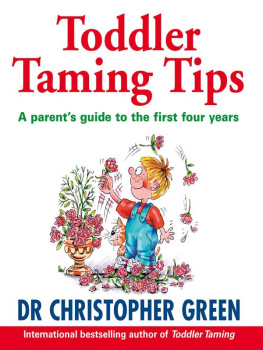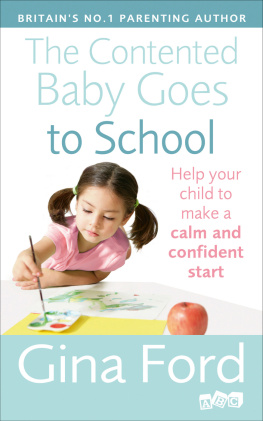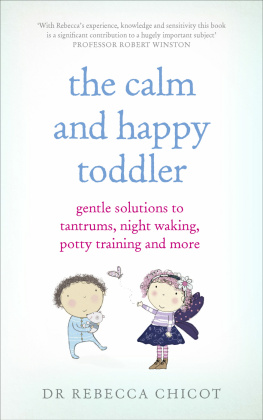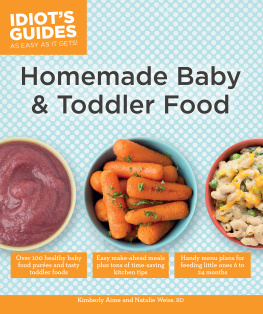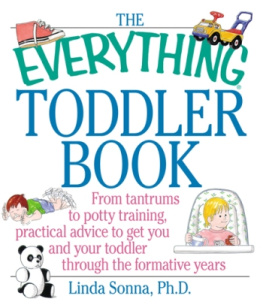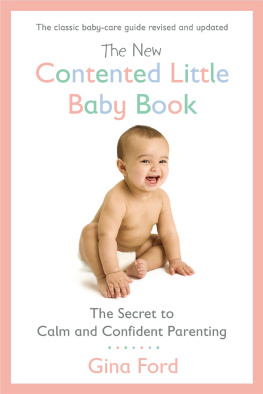Contents
The
Contented
Toddler
Years
Gina Ford

About the Book
As babies grow, so their routines and patterns change. In The Contented Toddler Years Gina addresses the many changes in sleeping and feeding habits that arise during the second and third year. She offers invaluable advice and insight into these crucial stages of a childs development, from walking and talking, to teething and potty training and also shows you how to:
- deal with tantrums, food refusal and sibling jealousy
- prepare for the arrival of a second baby, including how to cope physically, emotionally and financially, and how to adapt her routines when caring for a baby and toddler
- make teeth-cleaning fun and put an end to habits such as thumb-sucking, nail-biting and eating dirt
- decide what type of childcare is best for you and your toddler
Ginas advice is derived from hands-on experience of dealing with children. Parents can be confident that her techniques, which have been tried and tested many times and have proved successful with many different children, can also work for them. She has listened to the concerns of thousands of parents via her consultations and website.
Reassuring and down-to-earth, parents will find Ginas advice can help make the passage from contented baby to confident child a happy and stress-free experience for the whole family.
About the Author
Gina Ford is Britains bestselling childcare author whose first publication The Contented Little Baby has sold over a million copies and keeps going! With over thirty years hands-on experience as a maternity nurse, her advice and methods have been a godsend to tired, stressed parents throughout the world and have helped a generation of children go to bed on time and sleep calmly through the night. She runs a hugely popular website: www.contentedbaby.com and has published over twenty parenting books.
To my beloved mother and best friend
in blessed remembrance of all her wisdom and the very special
love, support and encouragement she always gave me.
She taught me the difference between right and wrong
and how always to march to the beat of my own drum.
The Toddler Years an Introduction
I am often curious to know how parents envisage their children in the years ahead. Hopes and expectations vary enormously, but one ambition that most parents share is that their baby will grow up to be a healthy, happy and confident adult. During the growing years, parents assume that their child will develop many skills and attributes including, they hope, the ability to play contentedly with other children, the courage to face new challenges, politeness and generosity of spirit. It is a long list of expectations for a small human being, but it is what parents dream of and, to some extent, expect of their baby.
I have yet to hear a parent say, I dont mind if my baby turns out to be a spoilt toddler and a selfish, bad-mannered child. Of course, even with skilled parenting and excellent routines, all children misbehave at times. Frustrations will arise and tantrums will result, but this is normal and should be anticipated. Yet, at toddler groups or in the playground, many of us will have met a child who is unusually difficult to handle and whose behaviour is often challenging.
These children were not born like that, so whats gone wrong? The blame is often laid on the parents. The older generation may declare that todays children are over-indulged and that a tougher line should be taken from day one. If, however, we consider the views of psychologists, and those involved in child development, the authoritarian approach is often thought to be the cause of insecurity in children and unhappiness in adults.
I do not profess to have all the answers on how to help your contented baby become a confident child. However, over the years, my hands-on experience of working and living with families all over the world has taught me a great deal about what works and what doesnt. I have observed the behaviour, both good and bad, of hundreds of toddlers and young children and also considered the different ways in which parents deal with their childrens discipline. Some will follow their own parents strict, autocratic approach; others have a more liberal style, taking time to talk, explain and reason with their children. Regardless of approach, parents can get very distraught about their childrens difficult behaviour, leading to feelings of guilt, frustration and ultimately desperation.
I have written this book with the aim of enhancing parents knowledge and understanding of their toddlers needs, desires and behaviour. With this wisdom, the different characteristics of each developmental stage can be anticipated, and any difficulties can be addressed with calmness and confidence. The toddler years present a steep learning curve for both parent and child, and a deeper insight into the challenges and delights of this special period will enrich your experience. But it is not rocket science. It is my belief that the simple combination of a safe and happy home, a healthy diet, a good routine, encouragement and love will successfully result in your baby becoming a confident child.
1
The Second Year (12 to 24 months)
A child learns more between the ages of one and three years than at any other time in his life. The learning process often ends up in tears of frustration through not being understood, and sheer exhaustion from having to learn so many different things at the same time. This time often sees the arrival of a new baby, which adds the fear of abandonment and feelings of jealousy to the very long list of emotions with which the toddler has to cope.
Listed below are just a few of the main skills and challenges a toddler has to deal with in his second year:
- Learning to become more physically independent walking and climbing
- Learning to make his needs understood talking
- Learning how to make choices about what to eat and how to feed himself
- Learning to undress and eventually to dress himself
- Learning how to integrate with other toddlers playing and sharing
Managing your toddler
Creating a safe, happy and relaxed environment will help increase the toddlers confidence during this critical stage of mental, physical and emotional development. However, there will be times when he becomes so challenged that he finds it difficult to cope. Therefore, it is essential that parents set very clear limits and boundaries for dealing with any difficult behaviour caused by their toddlers frustration.
For example, as adults, if we choose to learn how to drive, we place ourselves in the hands of a driving instructor. A good teacher makes the rules and sets the limits, and provides us with a sound framework so that we can learn to drive successfully. He will also show great patience and tolerance as we learn to master both the mental and physical skills needed to drive properly and safely. He will not ridicule or punish us when we make a mistake. However, he would take over the control of the car if we were about to make a mistake that could have serious consequences.
It is important that parents show the same patience and tolerance when their toddler is learning the numerous new skills with which he is faced, and, when necessary, be prepared to take charge if things appear to be getting out of control. There is very little room for punishment at this stage of child development.
Toddlers, if they are to grow into confident and happy children, need to learn with the minimum of frustration. As adults and teachers it is our responsibility to ensure that we provide our children with a sound framework, and a clear set of rules and limits that help the toddler face the challenge, not that challenge the toddler. The right environment, along with your help and encouragement, will make it easier for your toddler to master the many skills he has to learn during toddlerhood.
Next page







